Here is a compact table listing all of the Senate candidates.
The current breakdown of the Senate is as follows (where we count the two independents as Democrats):
- 26 Democratic seats up for reelection in 2018 and 23 seats not up, for a total of 49 seats
- 8 Republican seats up for reelection in 2018 and 43 seats not up, for a total of 51 seats
In a reversal from 2016, the Democrats will be playing defense, trying to hold the 10 seats in states that Donald Trump won. There is only one Republican seat, that of Sen. Dean Heller (R-NV), in a state that Hillary Clinton won.
The Democratic-held seats are listed first below, in alphabetical order by state, with the Republican ones following.
Click on a picture for the candidate's webpage.
Click on a name for the candidate's entry in Wikipedia.
Click on a party (D) or (R) for the state party.
The  indicates a race to watch.
indicates a race to watch.
All links open in a new window. Type CTRL-W in the window to close it (Command-W on a Mac).
Democratic-held seats
California
| Incumbent | Challenger | Notes Polls |

Dianne Feinstein (D) |

(R) |
Dianne Feinstein will be 84 on Election Day, which is well past retirement age in most professions, but is middle aged in a body where members sometimes linger past the century mark (see Thurmond, Strom). She's given every indication she plans to run for her fifth term, and she will likely get it. The only real threat to Feinstein is a challenge from the left; her generally moderate political positions are not a great match for a state where the Democratic base loathes Donald Trump and is out for blood. Indeed, state party activists have been trying to gently coax the Senator to ride off into the sunset. The good news for Feinstein, assuming she sticks to her guns, is that California is also electing a new governor in 2018. Since Jerry Brown (D) is term limited, that makes his job a much more realistic target for the rising Democratic stars of the state, like Lt. Gov. Gavin Newsom and former Los Angeles mayor Antonio Villaraigosa. As long as Feinstein raises piles of money (she's already pulled in nearly $6 million), and shows no signs of weakness, she's likely to convince the top-tier candidates to leave her alone and to focus on the governor's mansion. Thus far, she has only drawn one Democratic challenger—perennial candidate Douglas Howard Pierce—and no Republican. Given California's jungle primary, it may end up that Feinstein ends up facing a member of her own party on November 6. |
Connecticut
| Incumbent | Challenger | Notes Polls |

Chris Murphy (D) |

(R) |
Nothing to see here. Murphy is popular in his home state, is a leading Trump critic, and won his first Senate election by 11 points. This time, he figures to win re-election by an even larger margin. His Republican opponent last time was self-funding WWE millionaire Linda McMahon. She presumably won't be back, since she is now Administrator of the Small Business Administration for the Trump administration. If the Connecticut GOP can't find more cannon fodder—er, another self-funder—in 2018, they may not even bother fielding a challenger. |
Delaware
| Incumbent | Challenger | Notes Polls |

Tom Carper (D) |

(R) |
Given how many seats the Democrats need to defend in 2018, they are lucky that quite a few of them are safe. Delaware is in that category; the state is very blue, and Carper has a 3-to-1 approve-to-disapprove ratio. He's been earning a lot of attention for his battles with EPA Administrator Scott Pruitt, and appears set to make global warming and the environment the centerpiece of his re-election pitch. The Republican bench in the Diamond State is paper thin, and unless state treasurer Ken Simpler decides to make a run, Carper's opponent—if he ends up with one—will likely be an unknown. |
Florida 
| Incumbent | Challenger | Notes Polls |
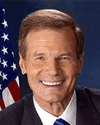
Bill Nelson (D) |

(R) |
Nelson enjoys wide approval, has collected nearly $4 million in contributions already, and seems likely to benefit from the national political climate. After all, if Democrats can make R+10 and R+16 districts competitive thanks to anti-Trump sentiment, then an R+2 state should be a relative cakewalk. However, there is a chance that Nelson will draw a formidable challenger—Gov. Rick Scott (R), who is term-limited, and so will be looking for a job as of January 2019. If Scott enters the race, he has the name recognition and the fundraising ability to make a real contest of it. Until he decides, other possible Republican challengers are keeping their plans to themselves, and the race is in a holding pattern. Likely, Scott—who endorsed Donald Trump—wants to see if The Donald's fortunes rise or fall. If Trump remains enmeshed in scandal and low approval ratings, Scott will likely stay out, since Nelson will paint him as the President's twin brother. If it's not Scott, then Lt. Gov. Carlos López-Cantera—who ran for Marco Rubio's Senate seat before stepping aside due to Rubio's surprise decision to run for re-election—is a strong possibility. López-Cantera would make Nelson sweat a bit, but not as much as Scott would. |
Hawaii
| Incumbent | Challenger | Notes Polls |

Mazie Hirono (D) |

(R) |
Hawaii is the bluest state in the Union, and Hirono has solid approval ratings. The only thing she has to fear is a challenge from the left, and the likeliest candidate to do so—Rep. Tulsi Gabbard (D)—has already opted out of the race. Hirono may not draw a GOP opponent; the Republican in both of Hawaii's last two senate races was John Carroll, a perennial candidate who has also run twice for the governorship of Hawaii and once for the House of Representatives. Though Carroll has served in the state legislature, he last held office in 1980, and will be 86 on Election Day 2018. He presumably won't run again, and if he does, he won't be a factor. |
Indiana 
| Incumbent | Challenger | Notes Polls |
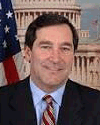
Joe Donnelly (D) |

(R) |
This is shaping up to be a tough race for Donnelly. On one hand, he has a good (but not great) approval rating, his fundraising is going well (almost $4 million so far), and he's got the advantages of incumbency. On the other hand, Indiana's a red state that Donald Trump won by 19 points, and Donnelly only won his first Senate race because tea partier Richard Mourdock shared his views on rapes being a part of God's plan. The Republican bench is deep in Indiana, and several prominent members of the Party are weighing runs, though no serious challenger has thrown his hat into the ring yet. The possible contenders are likely waiting to see what happens with the AHCA; few states will be hurt more by an Obamacare repeal, and if the repeal actually goes through, it will make for an ugly campaign for any Republican. Of course, Donnelly is going to make an issue of the AHCA regardless of what happens. Otherwise, though, he's been steering a very centrist course, supporting most of Donald Trump's cabinet nominees, and being one of only three Democrats to vote for SCOTUS nominee Neil Gorsuch. |
Maryland
| Incumbent | Challenger | Notes Polls |
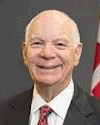
Ben Cardin (D) |

(R) |
If Ben Cardin wants a third term, he can have it. However, he will be 74 on Election Day, and hasn't yet decided if he wants to run again. If he were to call it a career, the likeliest replacement is Rep. Elijah Cummings, who is a rising star in the Democratic Party. The Republicans actually have a bench in the Old Line State, starting with Governor Larry Hogan, but no serious GOP challenger has shown an interest in running as yet. |
Massachusetts
| Incumbent | Challenger | Notes Polls |
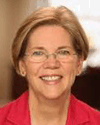
Elizabeth Warren (D) |

(R) |
Warren has a huge national profile, is leading the 2018 field in fundraising ($14.6 million), has one of the highest approval ratings in the Senate (64%), and is a leader of the opposition to President Trump. In short, although she took only 54% of the vote in her first Senate election, she's a heavy favorite to win a second term. Massachusetts is not averse to electing Republicans, including Gov. Charles D. Baker and Lt. Gov. Karyn Polito. The problem the GOP is facing is that none of their top-flight candidates wants to run. This being the case, they are stuck with a collection of second-tier options, none of whom is a threat to Warren. |
Michigan 
| Incumbent | Challenger | Notes Polls |
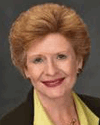
Debbie Stabenow (D) |

(R) |
Debbie Stabenow eked out a victory in her first Senate race, defeating incumbent Spencer Abraham (R) 49.5% to 48%. Since then, she's won by 16 and 21 points, so she's favored to win election a fourth time. That said, her approval ratings are only middling (49%), and Michigan is very purple these days. Republicans have thus targeted Stabenow's seat as a pickup opportunity, and the state GOP is already running a commercial making hay out of the Senator's vote against SCOTUS nominee Neil Gorsuch. There aren't too many places where Donald Trump's successes in the next year, or lack thereof, will matter more. At the moment, given the President's struggles, the GOP is having trouble recruiting a top-flight candidate. Thus far, the only declared Republican is Lena Epstein, a newcomer whose campaign will be financed by her family's oil money. In terms of possible opponents, Reps. Justin Amash and Fred Upton have both been mentioned, as has former Michigan Senate Majority Leader Randy Richardville. And, now that we live in a political world where experience doesn't matter, the names of musicians Ted Nugent and Kid Rock have also been floated. Amash and Upton could pose a serious challenge to Stabenow; the others, not so much. |
Minnesota
| Incumbent | Challenger | Notes Polls |

Amy Klobuchar (D) |

(R) |
Amy Klobuchar is one of the most popular members of the Senate (67% approval), has already banked $4.1 million for her re-election campaign, and won her previous Senate elections by 35 and 21 points. She's going to benefit from the fact that the Minnesota governor's mansion will be open, and so will be a much more attractive target for both aspiring Republicans and Democrats. It may also help her that five different Minnesota house races are expected to be highly competitive; these could suck up most of the political donations and make it hard for a GOP challenger to gain the financial traction that is needed for a Senate run. Indeed, so far only Rep. Erik Paulsen (R) has even admitted to considering it. Add it all up, and it's likely Klobuchar draws a second-tier challenger and then scores another big victory, keeping her 2020 presidential aspirations alive. |
Minnesota-special
| Incumbent | Challenger | Notes Polls |
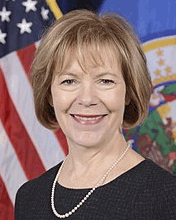
Tina Smith (D) |

(R) |
Al Franken's seat wasn't up in 2018, but due to his resignation from the Senate, a special election will be held for it in 2018. Appointed senator Tina Smith is expected to run. Minnesota is fundamentally a blue state, so she is probably the favorite. It is too early to say whether there will be a Democratic primary. There almost certainly will be a Republican primary, though. |
Missouri 
| Incumbent | Challenger | Notes Polls |
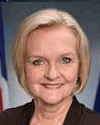
Claire McCaskill (D) |

(R) |
Few incumbents face a more daunting challenge in 2018 than Claire McCaskill. Her approval ratings are not far above water (48% approve, 36% disapprove) and Donald Trump won her state by nearly 20 points. She's already the subject of a commercial blitz hammering her for her support of Planned Parenthood, her opposition to the AHCA, and her failure to solve Missouri's opioid-addiction crisis (as if a U.S. Senator somehow has the power to end drug abuse). McCaskill is doing what she can to fight back, though she's got to walk a fine line. For example, she has been put in an odd position by VoteVets, which is running ads touting her pro-veteran voting record. While the Senator is pleased to have that information publicized, VoteVets is a super PAC funded by the sort of "dark money" that McCaskill has opposed, and so the commercials make her look hypocritical. Ergo, she's disavowed the ads, despite their being pro-McCaskill. The GOP's #1 choice to run for the seat, Rep. Ann Wagner, opted out. However, the party still has a deep bench to draw on, from Reps. Sam Graves and Vicky Hartzler to Missouri Attorney General Josh Hawley to former NASCAR driver Carl Edwards. The only Republicans who have actually declared, however, are a pair of unknowns. Until we see what the GOP side of the race looks like, it's hard to properly assess McCaskill's chances. |
Montana 
| Incumbent | Challenger | Notes Polls |
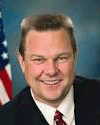
Jon Tester (D) |

(R) |
Montana is a tough state to get a read on. On one hand, Donald Trump won there by 20 points, and Greg Gianforte just claimed a comfortable victory in the race for the state's only Congressional seat despite having beaten up a reporter on the eve of the election. On the other hand, Montana's governor is a Democrat, and Tester has managed to get elected twice (albeit by slim margins). If his opponent was Ryan Zinke, Tester would be sweating right now, but Zinke chose to become Secretary of the Interior instead, and—barring a change of plans—won't be running. Instead, the GOP's favored candidate will be State Auditor Matt Rosendale, who is quite conservative, but has the liability that he's a fairly recent arrival in Montana (2000), which makes him a bit of a carpetbagger compared to Tester (whose family has been in the state for a century). Two other Republicans have also declared; State Senator Albert Olszewski and businessman Troy Downing, but both are big underdogs to Rosendale. Whoever emerges on the Republican side will have an uphill battle, as Tester has the advantages of incumbency and a solid approval rating (57% approve, 32% disapprove). |
New Jersey 
| Incumbent | Challenger | Notes Polls |
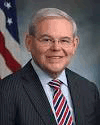
Bob Menendez (D) |

(R) |
New Jersey hasn't sent a Republican to the Senate since 1972, so this seat is likely to remain in Democratic hands next year. The question is: Will those hands belong to Bob Menendez? Certainly, he wants to run again, and is already airing commercials and raising money. However, the Senator has been connected to a shady eye doctor named Dr. Salomon Melgen. Melgen is now a convicted felon, and Menendez has been indicted for taking bribes from him. Nothing has been proven yet, but it certainly doesn't look good, even in a state that has a certain tolerance for corruption. The worst case scenario for the Democrats is that the trial lingers, but Menendez refuses to bow out and insists on running with the scandal hanging over his head (not to mention his worst-in-the-Senate 36% approval rating). That just might open the door for a Republican to eke out a victory. Thus far, none has declared, but the New Jersey GOP bench is fairly deep. Gov. Chris Christie is the most famous name, but he's pretty widely loathed in the Garden State these days. More probable is Rep. Tom MacArthur. |
New Mexico
| Incumbent | Challenger | Notes Polls |

Martin Heinrich (D) |

(R) |
Martin Heinrich is only moderately popular in his home state, but New Mexico's blueward trend works in his favor. So too does the fact that the New Mexico governor's mansion will be vacant, making this yet another state where that may prove a more attractive alternative than taking on a sitting U.S. Senator. Term-limited Gov. Susana Martinez (R) may choose to challenge Heinrich, and if she does, she could make it interesting. At the moment, however, his only opponent is businessman Mick Rich, an unknown with no political experience. So, the seat is safe for now, and likely leans Democrat even if Martinez does enter the race. |
New York
| Incumbent | Challenger | Notes Polls |
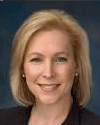
Kirsten Gillibrand (D) |

(R) |
Donald Trump is not popular in his very blue home state, and Gillibrand has been a leader of the anti-Trump forces in Congress, giving her national stature. Though New York is very populous, the GOP bench is pretty thin, and few Republicans want to subject their career to the Gillibrand buzz saw. In the state's last two Senate elections, Wendy Long was the GOP's sacrificial lamb; She lost to Gillibrand by 53 points in 2012, and to Sen. Chuck Schumer by 43 points in 2016. Whether Long returns for a third serving of humble pie or not, this one is about as safe as it gets for the Democrats. |
North Dakota 
| Incumbent | Challenger | Notes Polls |
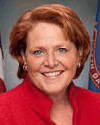
Heidi Heitkamp (D) |

(R) |
There's no question that North Dakota is Trump territory—he won the state by 36 points. Further, Heitkamp is the only Democrat serving North Dakota at the state or federal levels, and her first victory—aided by the coattails of Barack Obama—was very thin, 50.5% to 49.5%. So, she certainly has her work cut out for her. That said, the Senator knows how to win in the Roughrider State: Essentially, pretend you're not a Democrat. After all, the official name of the state party is the North Dakota Democratic-Nonpartisan League Party. Heitkamp has pointedly refused to "join" the Trump opposition, and has given her vote to more of his cabinet nominees than any other Democratic senator, while also supporting many of his regulation rollbacks. The GOP is hoping that Rep. Kevin Cramer agrees to challenge Heitkamp, but he seems to prefer remaining in his safe Congressional seat. If he doesn't run, then the GOP candidate will be a retread, possibly Rick Becker (who lost the governor's race in 2016) or Rick Berg (who lost to Heitkamp in 2012). If Cramer enters the race, then it's a toss up; anyone else and Heitkamp's the favorite to keep her job. |
Ohio 
| Incumbent | Challenger | Notes Polls |

Sherrod Brown (D) |

(R) |
Democrats are watching this one carefully, not only because it's a battleground state, but because Sherrod Brown might provide a template for how the party can win in the Midwest going forward. He's a liberal, but one with strong populist leanings. He laments trade agreements, for example, and is strongly pro-union. At the same time, Brown disdains the divisiveness of Donald Trump, declaring that you have to be for all the "little guys" or for none of them. He's also been critical of many Trump appointments, remarking that the White House "looks like a retreat for Goldman Sachs executives," and has insisted that the financial sector must be reined in. Because Brown has played his hand so well, Ohio is another state where the GOP is having trouble recruiting top-notch talent. Thus far, the only declared candidate is State Treasurer Josh Mandel, and many other high-profile options have either opted out (Rep. Pat Tibieri) or decided to shoot for the governorship (Rep. Jim Renacci). Term-limited Gov. John Kasich would certainly give Brown a run for his money, but he's insisting his political career is over, and is more likely to run for president again if it's really not. |
Pennsylvania 
| Incumbent | Challenger | Notes Polls |

Bob Casey (D) |

(R) |
Casey has made an interesting choice, given that he comes from a state won by Donald Trump: He's rapidly evolved from a quiet moderate to an outspoken member of the resistance. It's probably a wise call; Trump won the Keystone State by the barest of margins, and Casey is counting on Democratic enthusiasm to carry the day next November. Working to his advantage, given how expensive it is to campaign in Pennsylvania, is that he's doing very well in the fundraising department—his $6.6 million trails only five of his colleagues. Also in his favor is that Republicans are lining up in droves to challenge him. State Reps. Jim Christiana and Rick Saccone are already in, as are businessman Jeff Bartos and Berwick Councilman Andrew Shecktor, while state Senate Majority Leader Jake Corman and U.S. Reps. Mike Kelly, Lou Barletta, and Tom Marino are giving a run serious consideration. The odds are good that the Republicans will bloody one another, and drain each other's bank accounts, while Casey watches from the sidelines. This race may not be a slam dunk for the Democrats, but it's still pretty safe. |
Rhode Island
| Incumbent | Challenger | Notes Polls |

Sheldon Whitehouse (D) |

(R) |
Rhode Island is one of the bluest states in the country, with a grand total of zero Republicans holding office at the state and federal levels. Whitehouse won his last Senate race by 30 points. So, there's not much drama here. State Rep. Robert Nardolillo has volunteered himself as Whitehouse's victim, er...opponent. Thus far, no other Republicans have signaled an interest in joining him. |
Virginia
| Incumbent | Challenger | Notes Polls |
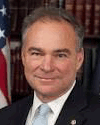
Tim Kaine (D) |

(R) |
Kaine has very solid approval numbers (53% approve; 25% disapprove), and comes from the only Southern state to go for Hillary Clinton. He's been raking in the money (nearly $8 million so far); that, and the high stature that comes from his VP run means that he's in great position to be elected to a second Senate term. A long list of Republicans, from tea partier Rep. Dave Brat, to talk show host Laura Ingraham, to former HP Executive Carly "I'll Run in Any State in the Union" Fiorina, have signaled interest in challenging Kaine. They will undoubtedly be given pause by the fact that early polls have the Senator trouncing any of them by 20-plus points. The most serious threat would probably be popular Rep. Barbara Comstock (R), but she's currently keeping things close to the vest. The only declared Republican is Prince William County Board of Supervisors Chair Corey Stewart, who is fresh off an unsuccessful run for governor. Stewart is a Trump man, through and through, who does not seem to have noticed that Virginia went for Clinton-Kaine by six points. He's not going to cause Kaine to lose much sleep. |
Washington
| Incumbent | Challenger | Notes Polls |

Maria Cantwell (D) |

(R) |
Cantwell is an outspoken opponent of Donald Trump, and has hewed to a Bernie Sanders-style party line, including a $15 minimum wage, aggressive protections for the environment, and healthcare for all. All of this makes her very popular in Washington, and an overwhelming favorite to be elected to a fourth term. While there are some heavy-hitting Republican politicians in the Evergreen State, most notably Reps. Cathy McMorris Rodgers and Jaime Herrera Beutler, none of them has given the slightest indication that they want to die on this particular hill. Cantwell won her last Senate race by 20 points, the one before that by 26, and given the apparent lack of opposition, figures to improve on those numbers in 2018. |
West Virginia 
| Incumbent | Challenger | Notes Polls |
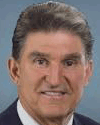
Joe Manchin (D) |

(R) |
West Virginia went for Donald Trump by a mind-boggling 42 points, which leaves Joe Manchin dead in the water, right? Not so much. Manchin has won five statewide elections, most of them in landslides. In 2004, for example, he was elected governor by 30 points, and he won his last Senate election by 24 points. He's also one of the 10 most popular members of the Senate, with a 66% approval rating. The upshot is that he knows how to keep his constituents happy, joining with the Democrats on some issues (pro-labor, pro-Obamacare) and jumping ship on others (pro-coal, pro-life, pro-gun). He's going to get a challenge from the left, in the form of environmentalist Paula Jean Swearengin, who is apparently unaware that West Virginia's economy is based on coal. Manchin will defeat her with ease, and then will tangle with a serious Republican challenger, possibly Rep. Evan Jenkins. West Virginia is being rated as a battleground state because of its deep redness, but that raises an obvious question: What has changed since Manchin won those five elections? The answer is: Not much, as the Mountain State has been very red for Manchin's entire career. So, this is likely not the pickup opportunity that many Republicans are hoping it is. |
Wisconsin 
| Incumbent | Challenger | Notes Polls |
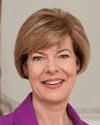
Tammy Baldwin (D) |

(R) |
Given Baldwin's middling approval ratings (45%) and Wisconsin's redward trend, the national GOP sees Wisconsin as one of their best pickup opportunities. To that end, various super PACs are already airing ads blasting the Senator for her support for the Iran deal, for her failure to cure Wisconsin's opioid crisis, and for being part of the "establishment." That's the bad news for Baldwin, now the good news. Her fundraising is brisk ($6 million so far), and the DSCC has made clear that she will be a major focus for their efforts. Further, the GOP's most attractive challenger, Rep. Sean Duffy, has already opted out. Baldwin will still draw a serious Republican foe, possibly Rep. Mike Gallagher or Rep. Glenn Grothman, or maybe Lt. Gov. Rebecca Kleefisch, but none has the name recognition of Duffy (who is, like the President, a one-time reality TV star). This will be a tough fight for the Wisconsin senator, but she's still a moderate favorite. |
Independent-held seats
Maine
| Incumbent | Challenger | Notes Polls |

Angus King (I) |

(R) |
King is very popular in Maine and, as an independent, can reasonably expect to get both Democratic and Republican votes. Of course, that means he can also reasonably expect to face both a Democratic and Republican challenger, all the way to the bitter end. Thus far, the only Democrat is Diane Russell, a one-time state representative. She's no real threat; since King caucuses with the Democrats, he will have the Party's de facto endorsement. His biggest challenges have always come from the right side of the aisle. On that front, however, King got good news when Gov. Paul LePage decided not to run. That leaves only State Senator Eric Brakey, who has limited name recognition statewide. Assuming that stronger challengers do not present themselves, which does not seem likely, King will get his second term. |
Vermont
| Incumbent | Challenger | Notes Polls |

Bernie Sanders (I) |

(R) |
Bernie Sanders is the single most popular senator in America, with a staggering 83% approval rating. As a leader of the Trump resistance, he's a great match for a state that gave 70% of its votes to non-Trump candidates. Given that he's a Democrat in all but name, he may not draw a challenger from that direction. And the Republicans are probably only going to be able to come up with a perennial candidate like Scott Milne, who ran for governor in 2014 and for the Senate in 2016. Oh, and if the Bern needs cash, all he needs to do is shake the donor money tree he built in 2016. This one is about as certain as it gets. |
Republican-held seats
Arizona 
| Challenger | Challenger | Notes Polls |

(R) |

Kyrsten Sinema (D) |
The Democrats see this as one of their best pickup opportunities. Flake is one
of the least popular Senators in Washington, with a miserable 39% approval
rating. He barely won his first Senate race, failing to clear 50% of the vote.
When he saw the polling that he was going to lose to tea partier Kelli Ward,
who the blessing of both Donald Trump and Steve Bannon, he decided to "retire"
before the voters retired him.
Rep. Martha McSally (R-AZ) is challenging Ward in a primary and it could get bloody, possibly
with Trump and Bannon for Ward and Mitch McConnell for McSally.
The Democrats got their preferred candidate, Rep. Kyrsten Sinema (D-AZ), the only openly bisexual
person in Congress. she is conservative enough to have a decent chance in Arizona. There could be a second race in Arizona, as well, depending on what happens with Sen. John McCain (R), who was diagnosed with an aggressive form of brain cancer. If he steps down, his replacement would also be chosen on Election Day. If this comes to pass, the Democrats will go all out in Arizona with their advertising and their get-out-the-vote operations. This could also encourage higher-profile Democrats to throw their hats into the ring. |
Mississippi
| Incumbent | Challenger | Notes Polls |
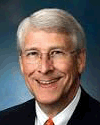
Roger Wicker (R) |

(D) |
There was a time when Democrats could win elections in Mississippi by just showing up, but then the Civil Rights Movement happened. The last time the state sent a Democrat to the Senate was in 1982, when John C. Stennis was elected to the final term of a career that began in 1947. Roger Wicker is going for a third term in 2018. The only possible fly in the ointment is Steve Bannon, who is considering backing Chris McDaniel, who is Bannon's kind of guy and who narrowly lost the 2014 senatorial primary in a very bitter fight. If McDaniel runs and Bannon manages to scare up enough money to support his candidacy (which may not be so easy after what happened in the Alabama special election), then the primary could be close. Against Wicker, the Democrats have no chance, but against McDaniel, well, the Democrat has about as much chance as a Democrat would have in Alabama. Oh wait ... |
Nebraska
| Incumbent | Challenger | Notes Polls |
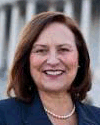
Deb Fischer (R) |

(D) |
Fischer has moderate approval ratings (54%), and is having some success at fundraising ($2.4 million). However, her real Achilles' heel is healthcare—Nebraska would be among the states hurt most by the AHCA, and Fischer has already faced more than one angry town hall crowd. Depending on how things unfold on that front, a seat that is currently safe for the GOP could be put in play. However, that would also require finding a viable challenger, and the Democratic bench is paper-thin. The only member of the blue team currently holding office at the state or federal level is Crystal Rhoades, who is Public Service Commissioner for District 2. Not exactly a springboard for those who aspire to higher office, generally speaking. Maybe the Democrats can dig up William Jennings Bryan and run him. |
Nevada 
| Incumbent | Challenger | Notes Polls |
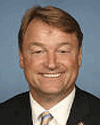
Dean Heller (R) |

Jacky Rosen (D) |
Heller is the most endangered Republican senator in 2018, first and foremost because he's the only one from a state won by Hillary Clinton, but also because he's aggravated Latino voters with his support for Donald Trump and women voters with his votes to defund Planned Parenthood. He's also getting flayed for his health care votes, and so his approval rating is badly underwater (22% approve, 55% disapprove). To make it worse, he is first going to have to face a Steve Bannon-approved candidate, Danny Tarkanian, in the primary. That is sure to draw blood. Flake is probably going to win that one, but it could be costly. The Democrats have now settled on their candidate, Rep. Jacky Rosen (D-NV), and she doesn't appear to have any serious competition. She has the backing of former senator Harry Reid's considerable machine, so she may end up without serious Democratic competition at all. |
Tennessee
| Challenger | Challenger | Notes Polls |

(R) |

Phil Bredesen (D) |
When Donald Trump hounded "Little Bob Corker" out of the race in 2018, he may not have done his party a favor. The open seat attracted two-term governor Phil Bredesen. The The Republican front runner is Rep. Marsha Blackburn (R-TN), but a bloody primary is still a possibility. If Corker had stayed put, he would have waltzed to an easy reelection, assuming the Democrats even bothered to field a candidate against him. Now, it could be a competitive race, especially if the Republicans nominate a far-right candidate to face the popular Bredesen. |
Texas
| Incumbent | Challenger | Notes Polls |
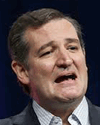
Ted Cruz (R) |

(D) |
There's no doubt that Cruz is currently a solid favorite to win election to the Senate for a second time. He has huge name recognition, a solid base of support, and has outraised all of his colleagues besides Elizabeth Warren, with receipts of $11.7 million. That said, his approval rating is only middling (52%), and many Texans are none too thrilled that he's using them as a stepping stone to bigger and better things, and/or that he's flip-flopped so dramatically on Donald Trump. Plus, if there's one guy the RSCC won't go out of its way to help, it's Ted Cruz, who is pretty much universally loathed by his colleagues. He's already drawn at least one serious Democratic challenger in Rep. Beto O'Rourke, whose Catholicism, folksy manner, and ability to speak Spanish fluently play well in the Lone Star State. There's also the possibility of a primary challenge, possibly from George P. Bush (son of Jeb) or Rep. Michael McCaul. In short, this one's not a serious race yet, but it has the potential to become one. |
Utah
| Incumbent | Challenger | Notes Polls |
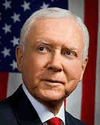
Orrin Hatch (R) |

(D) |
Thus far, Orrin Hatch—who will be 84 on Election Day—is the only sitting Senator to openly consider retiring. Until he decides, this one's in a holding pattern. If he decides to run (or at his age, walk slowly), he will win in a landslide. If he bows out, Mitt Romney is certain to run and win in a landslide. Romney has little interest in Senate business, but would use his platform to lambast Donald Trump daily. If Romney is the candidate, we may see the odd sight of a Republican president attacking a Republican Senate candidate every day. It won't matter a whit. Romney will still win in a landslide. But first Hatch has to make his decision. If Hatch were to stay in, Romney could challenge him in a primary and almost certainly win (due to Hatch's advanced age), but Romney is too much of a gentleman to challenge his old friend. |
Wyoming
| Incumbent | Challenger | Notes Polls |
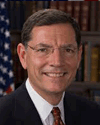
John Barrasso (R) |

(D) |
And finally, it's the biggest slam dunk of them all for the Republicans. Barrasso's 73% approval rating trails only Bernie Sanders and Sen. Susan Collins (R-ME). Wyoming is ruby red, and the last three Senate elections have been decided by 55, 54, and 47 points, respectively. Barrasso could beat up a reporter the night before the election, and then get caught in bed with a live boy and a dead girl, and he'd still win. The Democrats don't have a candidate yet, and are still trying to figure out if any members of the Party actually live in Wyoming. |
